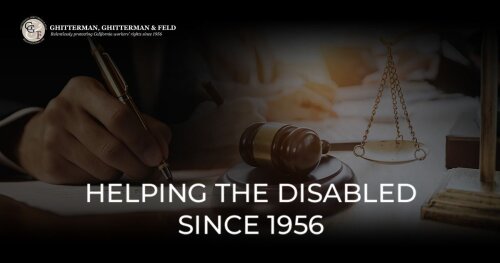Best Personal Injury Lawyers in Vermont
Share your needs with us, get contacted by law firms.
Free. Takes 2 min.
Or refine your search by selecting a city:
List of the best lawyers in Vermont, United States
About Personal Injury Law in Vermont, United States
Personal injury law in Vermont covers legal disputes that arise when an individual is harmed by the actions or negligence of another person, business, or entity. The purpose of personal injury law is to allow the injured party to seek compensation for losses such as medical bills, lost wages, pain and suffering, and other damages caused by the accident or incident. Personal injury cases in Vermont can include everything from car accidents and slip and fall incidents to medical malpractice and product liability claims.
Why You May Need a Lawyer
People often believe they can handle a personal injury claim on their own, but there are many situations where hiring a lawyer is crucial. If you have suffered serious injuries, are facing long-term or permanent disabilities, or have significant medical expenses, a lawyer can help ensure that you receive fair compensation. Insurance companies may offer settlements that do not cover your expenses or losses. In cases involving complex legal issues or disputed liability, legal representation becomes even more important. Lawyers are also skilled at negotiating, gathering evidence, and representing you in court if necessary.
Common situations where a personal injury lawyer may be needed include car accidents, pedestrian accidents, bicycle accidents, motorcycle crashes, slip and fall incidents, dog bites, medical malpractice, nursing home abuse, workplace injuries that involve third parties, and injuries caused by defective products.
Local Laws Overview
Vermont has specific laws and statutes that govern personal injury cases within the state. One key point is the statute of limitations, which is the deadline for filing a personal injury lawsuit. In Vermont, the statute of limitations is generally three years from the date of the injury. If you do not file a lawsuit within this period, you will likely lose your right to seek compensation.
Vermont follows a modified comparative negligence rule. This means that if you are found partially at fault for the accident, your compensation will be reduced by your percentage of fault. However, if you are found to be 51 percent or more at fault, you cannot recover any damages.
Vermont law also requires drivers to carry minimum amounts of liability insurance coverage, which can impact car accident claims. Additionally, there are special considerations and procedures for certain types of cases, such as claims against government entities or medical malpractice lawsuits, which may have different notice requirements or procedural rules.
Frequently Asked Questions
What is a personal injury claim?
A personal injury claim is a legal case brought by someone who has been injured due to another party's negligence or intentional act. The goal is to recover compensation for medical expenses, lost wages, and other damages.
How long do I have to file a personal injury lawsuit in Vermont?
In most cases, you must file a personal injury lawsuit within three years from the date of your injury. Missing this deadline can result in your claim being dismissed.
What if I am partly at fault for the accident?
Vermont uses a modified comparative negligence rule. If you are found to be less than 51 percent responsible, your compensation will be reduced by your share of fault. If you are 51 percent or more at fault, you will not be able to recover any damages.
What types of damages can I recover?
You may recover both economic and non-economic damages. Economic damages include medical bills, lost wages, and property damage. Non-economic damages include pain and suffering, emotional distress, and loss of enjoyment of life.
Do I need a lawyer to file a personal injury claim?
You are not required to have a lawyer, but an experienced attorney can help you navigate the legal process, gather evidence, calculate damages, and negotiate with insurance companies to maximize your compensation. Many lawyers offer free consultations and work on a contingency fee basis.
How is fault determined in a personal injury case?
Fault is determined by examining evidence such as police reports, witness statements, medical records, accident scene photos, and any other relevant information. Sometimes, expert testimony may be used to establish responsibility.
What should I do immediately after an accident?
Seek medical attention right away, even if you do not think you are seriously injured. Document the scene with photographs, collect contact information from witnesses, and report the incident to authorities if appropriate. Do not admit fault or make detailed statements to insurance adjusters.
Can I sue for emotional distress in a Vermont personal injury case?
Yes, you can include claims for emotional distress as part of your non-economic damages in a Vermont personal injury case if your emotional suffering is due to the accident or injury.
Are there caps on damages in Vermont?
Vermont does not have a general cap on damages in personal injury cases. However, certain types of cases such as medical malpractice or cases involving punitive damages may have different rules or limitations.
How long does it take to settle a personal injury case in Vermont?
The time required to settle a case varies. Some cases can be resolved in a few months through negotiation, while others may take a year or more if they go to trial. Factors influencing the timeline include the complexity of the case, the willingness of parties to settle, and the need for expert evaluations.
Additional Resources
Vermont Bar Association - Provides referrals and information on legal professionals specializing in personal injury law.
Vermont Attorney General's Office - Offers consumer protection resources and helps with complaints related to scams and fraud.
Vermont Judiciary - Contains information on Vermont court procedures, forms, and access to court records.
Vermont Department of Financial Regulation - Provides information on insurance regulations and helps with insurance-related issues.
Vermont Legal Aid - Offers free or low-cost legal services for qualifying individuals.
Next Steps
If you believe you have a personal injury claim in Vermont, your first step should be to seek medical attention and ensure your injuries are documented. Next, gather as much information as possible about the incident, including photographs, names and statements of witnesses, and any official reports. Do not discuss the details of your case or accept settlements from insurance companies before consulting a legal professional.
Contact an attorney who has experience in Vermont personal injury law for a consultation. Most personal injury lawyers will offer a free initial meeting to discuss the facts of your case and advise you on the best course of action. Acting promptly will help protect your rights and ensure you meet all deadlines and legal requirements.
Lawzana helps you find the best lawyers and law firms in Vermont through a curated and pre-screened list of qualified legal professionals. Our platform offers rankings and detailed profiles of attorneys and law firms, allowing you to compare based on practice areas, including Personal Injury, experience, and client feedback.
Each profile includes a description of the firm's areas of practice, client reviews, team members and partners, year of establishment, spoken languages, office locations, contact information, social media presence, and any published articles or resources. Most firms on our platform speak English and are experienced in both local and international legal matters.
Get a quote from top-rated law firms in Vermont, United States — quickly, securely, and without unnecessary hassle.
Disclaimer:
The information provided on this page is for general informational purposes only and does not constitute legal advice. While we strive to ensure the accuracy and relevance of the content, legal information may change over time, and interpretations of the law can vary. You should always consult with a qualified legal professional for advice specific to your situation.
We disclaim all liability for actions taken or not taken based on the content of this page. If you believe any information is incorrect or outdated, please contact us, and we will review and update it where appropriate.
Browse personal injury law firms by city in Vermont
Refine your search by selecting a city.










